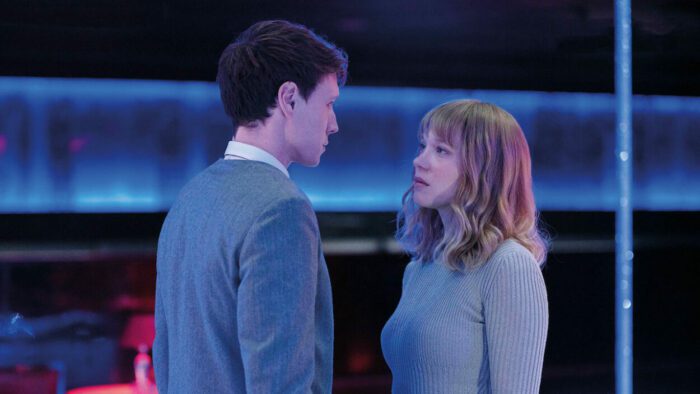It’s always an especially gratifying experience when a film you were really not enjoying or appreciating at all, suddenly inverts your perspective on it with a single moment, tying (almost) everything together and the whole mess before you suddenly coalesces into a unified, and quite brilliant vision. I’ve previously written a whole piece about films that do this, films whose final scenes make the whole so much more than the sum of their often questionable parts. When writing that article, I’m not sure I came up with a better example of that than The Beast, Bertrand Bonello’s often vexing, yet brilliantly cynical requiem for “Capital-R” Romance. It’s basically Cloud Atlas if Michael Haneke or maybe Ruben Ostlund had made it.
The film is set in a near-distant future, one where artificial intelligence has overridden humanity, not in a Terminator way, but a quietly insidious way where humans are now superfluous, irrational infantile nuisances that our new A.I. overlords attempt to train into being a bit less emotionally unstable. After all, you wouldn’t want the events of 2025 happening again now would you? This process is achieved by past life regression, allowing us to purge the trauma we’re carrying with us from our previous incarnations and become as affect-less and rational as the eerie, not-quite human “dolls” keeping us content. It’s optional, but Gabrielle (Lea Seydoux) is understandably resistant to undergoing such treatment, but since the powers that be won’t trust her with more stimulating work without it, she hesitantly gives it a try.

That’s the second Artificial Intelligence themed movie this year that connotes A.I. with East-Asian cultures by the way, although The Beast has very different, much darker and altogether more coherent ideas about A.I. than The Creator does. It’s really night and day, one of these movies uses these ideas as a shallow allegorical backdrop to a typically melodramatic action movie, the other actually has a substantive, eloquent, veiled and defiant point to make about the soul-destroying effects of technology on the human spirit and human relationships.
If you’ve seen Past Lives (and you really should have) then you’ll be familiar with the concept of In-yun, the layers of threads connecting any two individual souls throughout their life-cycles. Gabrielle has her soul-match, Louis (George MacKay), She meets him at the center for past-life regression and through the process she sees how they’ve been thrown together with fateful and fatal consequences throughout history. But things have never worked out between them and as the romantic sentiments of the past give way to an ever more callous, superficial and overstimulating future, perhaps the window for them to do so is closing?
In each incarnation, Gabrielle is plagued by an unnamable fear, the “beast” of the title. A perpetual sense of dread that something lies in her future, waiting to turn her joy to ashes. Tragedy of the conventional kind does certainly strike, but the horror of The Beast and yes, I do think it could be categorized in those terms, is much more subtle and terrible.
It’s a fascinating concept and the film paints a dryly comic, very bleak satirical portrait of the ways gender roles and our approaches to relationships have deteriorated over the past hundred years. This is somewhere the film does feel shallow and disingenuous. It’s romanticized vision of the belle epoque and its acrid portrayal of modern L.A. are both equally selective and let’s be honest, only one of them is ever that enjoyable to watch. I was consistently intrigued by the first hour or so, setting up the sci-fi scenario and following Gabrielle and Louis as they circle one another in Parisian high society. The second hour increasingly annoyed me with its cheap shots at vapid Hollywood Hills types and terminally online incels. It was funny for a while but drags on interminably as it veers into tawdry psychosexual thriller territory. MacKay is hilarious in this segment and a fair amount of the shots land, especially those aimed at the film industry itself, it just goes on way too long, intentionally frustrating the viewer through repetition and false promises. It’s once the film finally comes full circle that the full scope and full brilliance of Bonello’s vision is unveiled. It’s films like The Beast that are why I never give up on movies.
Like many, I was astonished when I first saw Lea Seydoux’s intensity and presence in Blue is the Warmest Color, and since then I’ve only grown more impressed by the emotional intelligence, candor and finesse she brings to each role (and more frustrated by roles that waste her talents, seeing only her beauty). The Beast is as fine a showcase as he’s ever had. Perhaps her inherent emotional maturity works against her in the middle section of the film, she’s a bit too composed and visibly too intelligent for this particular version of Gabrielle, but I’m not sure. She’s always captivating whenever she’s onscreen and so too is MacKay, who shows his versatility like never before. Both roles require bilingual performances, with multiple accents. Seydoux’s ability to speak English without a trace of a French accent is mightily impressive, as is MacKay’s jarring transformation into an American dumbass. I’d also like to praise the genuinely eerie Guslagie Malanda as “Kelly”, Gabrielle’s robot counsellor. Following on from her astonishing performance in Saint Omer, Malanda doesn’t need layers of makeup or millions of dollars of VFX to give us one of the most convincingly uncanny robot characters in the history of cinema. She does it all with her performance and it’s a rare and interesting example of a black woman as a robot. She’s a robotic servant and but her compassion is not submissive and honestly more intimidating than anything.
The Beast is undoubtedly a tough sell. Can I really say I loved it if I was moderately engaged by only half of it and actively irritated by most of the rest? I think so. Art is a journey, film especially, and it’s often only with the benefit of hindsight that you can really appreciate a film as a whole. The Beast tested my patience, no doubt. But it also rewarded it, considerably. The more I reflect on it, the more layered its cynical aestheticism becomes. It’s no mere statement of luddite nostalgia but a dark, dystopian mirror to a world that ever increasingly celebrates noise, dysfunction and content above sentiment. I’ll be thinking about this as much as any other film I’ve seen this festival and that alone is cause to celebrate it. Even at the very least, if the themes don’t speak to you or you don’t fully grasp what the film is going for, Seydoux carries the film marvelously.



